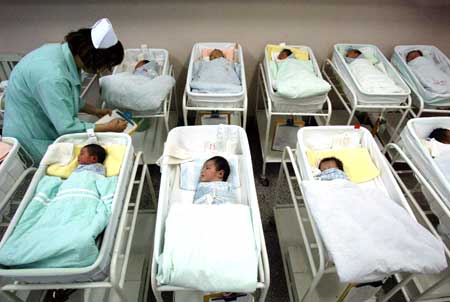Illegal placenta trade
After a woman delivers her baby and leaves the hospital, she usually leaves something behind that medical workers value - and it is not a thank you card.
 |
|
Newborn babies sleep in a hospital in Tianjin. Some hospitals allegedly sell placentas which are eaten for medicinal purposes. Photo: CFP |
It is called a placenta and it comes out after the newborn during delivery. And they are commonly sold by hospitals to unscrupulous buyers who turn them into Chinese medicine in the form of soup or other edible items.
Some people sell and buy them on the Internet just like clothes or books even though it is clearly illegal.
A middle-aged man surnamed Ye from Yunnan Province told the Global Times Sunday that he has been getting a steady supply of placentas from local hospitals now for three years. He buys about 2,000 to 3,000 placentas from facilities across the province every month, and then resell them online.
He pays about 20 yuan (US$2.9) for one and resells them for 35 yuan (US$5) each.
"I pack and freeze these fresh placentas and then hire vans to deliver them to buyers. My business is good," he said.
His customers include people from different sectors including housewives who believe placenta can improve health.
A online shop owner surnamed Chen who sells placentas told the Global Times that most buyers are from Guangdong, Zhejiang and Fujian provinces.
The placenta connects the growing fetus or embryo to a woman's uterine and it provides the link for blood and oxygen to flow to the baby.
In China, people have been using placentas for health reasons for some 2,200 years. The first emperor of China began using for this purpose.
On the record
Some of the traditional Chinese medicine books, such as the Compendium of Materia Medica written by Li Shizhen over 400 years ago, described the placenta as useful in improving immunity and slowing aging.
Nowadays, people use the placenta to make soup and dumplings, even though experts warn that eating this part of the human body may lead to infections if the placenta is not properly processed.
People's Daily reported Wednesday that police officers in Tongxu county in Kaifeng, Henan Province, arrested two people suspected of selling placentas. A hospital was found to have sold placentas to individuals or peddlers for more than a decade.
An unidentified doctor at the hospital said the department of gynecology and ob-stetrics collects about 100 placentas a week, and the hospital sells them to an agent for about 30 yuan each. The agent sells them to hotels, restaurants, and medicine sellers.
A Guangzhou resident surnamed Liu said she once bought a placenta from a hospital for 30 yuan. "I bought it to make soup, which is common in Guangzhou," Liu said.
The Chinese News of Traditional Chinese Medicine Introduction, a newspaper under the State Administration of Traditional Chinese Medicine, reported earlier that some hospitals even distributed placentas to medical workers as a staff benefit.
 0
0 







Go to Forum >>0 Comments